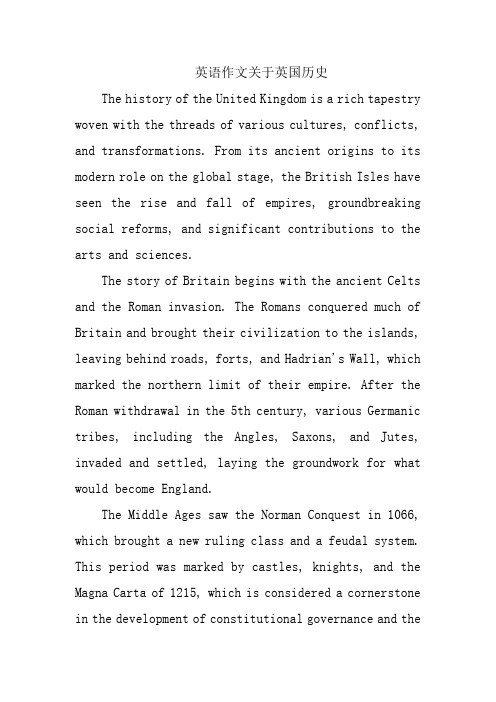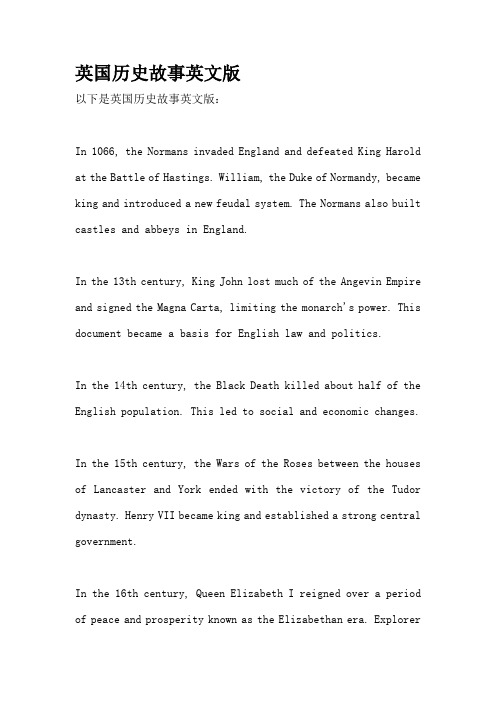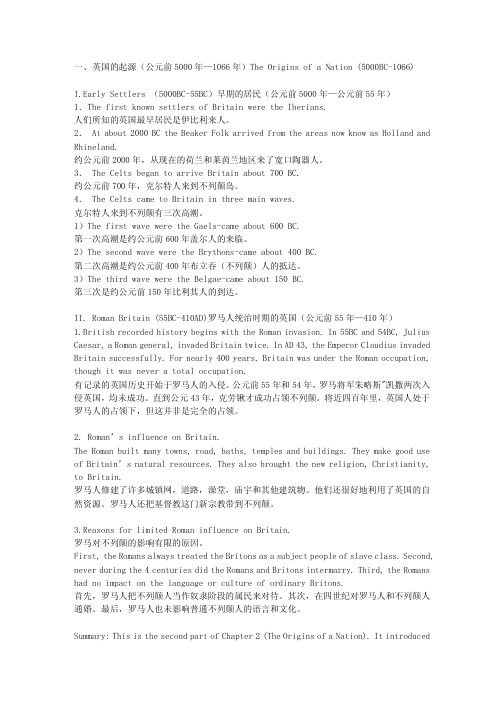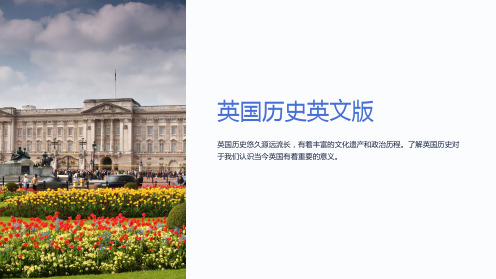英国历史简介英文版
英语作文关于英国历史

英语作文关于英国历史The history of the United Kingdom is a rich tapestry woven with the threads of various cultures, conflicts, and transformations. From its ancient origins to its modern role on the global stage, the British Isles have seen the rise and fall of empires, groundbreaking social reforms, and significant contributions to the arts and sciences.The story of Britain begins with the ancient Celts and the Roman invasion. The Romans conquered much of Britain and brought their civilization to the islands, leaving behind roads, forts, and Hadrian's Wall, which marked the northern limit of their empire. After the Roman withdrawal in the 5th century, various Germanic tribes, including the Angles, Saxons, and Jutes, invaded and settled, laying the groundwork for what would become England.The Middle Ages saw the Norman Conquest in 1066, which brought a new ruling class and a feudal system. This period was marked by castles, knights, and the Magna Carta of 1215, which is considered a cornerstone in the development of constitutional governance and therule of law.The Tudor period, from 1485 to 1603, was a time of great change. The Reformation split the Christian church in Britain, leading to the establishment of the Church of England. This era also saw the exploration and expansion of the British Empire, with figures like Sir Francis Drake and Walter Raleigh.The 17th and 18th centuries were significant for the growth of the British Empire and the Industrial Revolution. Britain became the world's leading naval power and colonized large parts of North America, the Caribbean, and India. The Industrial Revolution began in Britain and transformed the country from an agrarian society into an industrial powerhouse.The 19th century was a time of social and political reform. The Victorian era, named after Queen Victoria, was characterized by immense progress in science, technology, and culture, but also by deep social inequalities. The Reform Acts expanded the right to vote, and the labor movement fought for workers' rights.The 20th century brought two world wars, whichreshaped the map of Europe and saw the decline of the British Empire. The UK played a pivotal role in both conflicts, but the aftermath of World War II led to a significant reduction in Britain's global influence. Nonetheless, the British cultural influence remained strong, with the spread of the English language and the British Commonwealth.Today, the United Kingdom stands as a modern, multicultural nation with a rich historical legacy. It continues to be an influential player in international politics, science, and culture.中文翻译:英国的历史是一幅丰富的挂毯,由各种文化、冲突和变革的线编织而成。
英国历史简介英文

Roman influence on Britain was limited.
First, the Romans always treated the Britons as a subject people of slave class. Second, never during the 4 centuries did the Romans and Britons intermarry. Third, the Romans had no impact on the language or culture of ordinary Britons.
Christianity to Britain • Extraordinary achievement in
building roads – “All Roads Lead to Rome” • Hadrian's Wall – England’s great wall – 2000 years ago
Conqueror. ������
On October 14, 1066
William and his army defeated the English army in the battle of Hastings.
William was crowned King of England in Westminster Abbey, known as William I of England.
monarchs
Robin Hood
• England’s best-loved legend • Heroic Saxon noblemen oppressed by the Normans • ―“Merry men” robbed from the rich to
英国历史简介英文版

?Anglo-Saxon Britain (410-871)
Basis of Modern English race: the Anglo-Saxons ? The Angle, Saxon, and Jute tribes invaded in 5th and 6th centuries
? The Anglo-Saxons left their home in northern Germany and Denmark. ? The Heptarchy: seven principal kingdoms of Kent, Essex, Sussex, Wessex,
?– England was ruled by Danish kings.
?Alfred the Great
?? The king of Wessex ?? The father of British navy ?? A capable military leader ?and administrator
The Early Settlers (… -55 B.C.)
? 8,000 years ago ? Great Britain became an island ? Natives of Britain ? Iberians (3000BC-2000BC) ? The first settlers of Britain from the Mediterranean area
?King Arthur
? The best-known English legend ? The 5th century ? Story ? King Arthur united the British ? ?? His famous ―round table knights ? ?? Drove the Saxons back with his magical sword ? ?? A hero of British, who leads the defense against the Anglo-Saxon invaders
英国历史故事英文版

英国历史故事英文版以下是英国历史故事英文版:In 1066, the Normans invaded England and defeated King Harold at the Battle of Hastings. William, the Duke of Normandy, became king and introduced a new feudal system. The Normans also built castles and abbeys in England.In the 13th century, King John lost much of the Angevin Empire and signed the Magna Carta, limiting the monarch's power. This document became a basis for English law and politics.In the 14th century, the Black Death killed about half of the English population. This led to social and economic changes.In the 15th century, the Wars of the Roses between the houses of Lancaster and York ended with the victory of the Tudor dynasty. Henry VII became king and established a strong central government.In the 16th century, Queen Elizabeth I reigned over a period of peace and prosperity known as the Elizabethan era. ExplorerFrancis Drake circumnavigated the world in the Golden Hind.In the 17th century, King James I succeeded Elizabeth and established the Stuart dynasty. The English Civil War broke out in 1642 and ended with the execution of King Charles I in 1649. The monarchy was then abolished and replaced by a republican government known as the Commonwealth of England.希望这个故事能满足您的需求。
中英对照英国历史简介

一、英国的起源�公元前5000年—1066年�T h e O r i g i n s o f a N a t i o n(5000B C-1066)I.E a r l y S e t t l e r s�5000B C-55B C�早期的居民�公元前5000年—公元前55年�1�T h e f i r s t k n o w n s e t t l e r s o f B r i t a i n w e r e t h e I b e r i a n s.人们所知的英国最早居民是伊比利来人。
2�A t a b o u t2000B C t h e B e a k e r F o l k a r r i v e d f r o m t h e a r e a s n o w k n o w a s H o l l a n d a n d R h i n e l a n d.约公元前2000年�从现在的荷兰和莱茵兰地区来了宽口陶器人。
3�T h e C e l t s b e g a n t o a r r i v e B r i t a i n a b o u t700B C.约公元前700年�克尔特人来到不列颠岛。
4�T h e C e l t s c a m e t o B r i t a i n i n t h r e e m a i n w a v e s.克尔特人来到不列颠有三次高潮。
1�T h e f i r s t w a v e w e r e t h e G a e l s-c a m e a b o u t600B C.第一次高潮是约公元前600年盖尔人的来临。
2�T h e s e c o n d w a v e w e r e t h e B r y t h o n s-c a m e a b o u t400B C.第二次高潮是约公元前400年布立吞�不列颠�人的抵达。
3�T h e t h i r d w a v e w e r e t h e B e l g a e-c a m e a b o u t150B C.第三次是约公元前150年比利其人的到达。
《英国历史英文版》课件

World War II saw Britain stand
economic changes in the
alone against Nazi Germany, and
subsequent years.
the country's bravery in the face of
the Blitz remains an enduring
Stuart Era
James I and the Gunpowder Plot
King James I faced numerous challenges during his reign, including the infamous Gunpowder Plot in 1605.
Charles I and the English Civil War
Innovation and technological advancements led to a seismic shift in the way goods and services were produced, transforming the British economy and society adernize the country.
The decision to leave the European
Union in 2016 has plunged Britain
into years of uncertainty and
debate, as the country grapples
Victorian Era
Queen Victoria and the British Empire
Queen Victoria's reign marked the height of British power and influence, as the country enjoyed unprecedented prosperity and global supremacy.
英国历史作文英语介绍
英伦历史的斑斓画卷Encompassing a vast array of events and transformations, British history is a tapestry of diverse threads that weave together the rich cultural, political, and social fabricsof the nation. Spanning from ancient times to the modern era, this essay aims to delve into the fascinating journeyof Britain, highlighting key moments and figures that have shaped its identity.The ancient history of Britain begins with the settlement of the first humans on the island, known as the Stone Age. This period is marked by the development of primitive tools and structures, such as the Stonehenge, a mysterious monument that remains a testament to the ancient civilization's sophisticated understanding of astronomy.The Bronze Age saw the emergence of more advanced communities and trade networks, followed by the Iron Age, during which the Celtic tribes established their influence across the British Isles. However, it was the Romaninvasion in 43 AD that marked a significant turning pointin British history. The Romans brought with them newtechnologies, infrastructure, and a centralized government, leaving a lasting impact on British culture and society.The fall of the Roman Empire in the 5th century led toa period of political instability and cultural fusion known as the Dark Ages. This era was followed by the Norman Conquest of England in 1066, when the French-speaking Normans overthrew the Anglo-Saxon kingdom and established a new feudal system. This event marked a significant shift in the language and culture of England, as French became the language of the government and nobility.The Tudor period, marked by the reigns of Henry VII, Henry VIII, and Elizabeth I, saw the emergence of Englandas a major European power. Henry VII consolidated power and established the Tudor dynasty, while Henry VIII's reign saw significant religious changes, as he broke away from the Roman Catholic Church and established the Church of England. Elizabeth I, known as the "Virgin Queen," presided over a period of economic and cultural prosperity, during which England's naval power and exploration reached new heights.The 17th century marked a period of political upheaval, as the English Civil War erupted between the Royalists andthe Parliamentarians. This conflict ended with theexecution of King Charles I and the establishment of the Commonwealth under Oliver Cromwell. However, theRestoration of the Monarchy in 1660 marked the return ofthe Stuart dynasty and the end of the Puritan era.The 18th century was a time of significant social and economic transformation, known as the Industrial Revolution. This period saw the development of new technologies and manufacturing methods, which led to rapid urbanization and economic growth. The Empire expanded under the leadershipof George III, as Britain emerged as a global power, controlling vast territories and trading networks.The 19th century was marked by furtherindustrialization and imperial expansion. The Victorian era, named after Queen Victoria's long reign, saw significant economic and social progress, as well as the development of major cities like London. However, it was also a period of social and political tensions, as the working class struggled for better conditions and rights.The 20th century brought with it two world wars and significant social and political changes. Britain'sinvolvement in the First World War led to significant casualties and economic hardships, while the Second World War saw the country stand against fascism and emerge as a key ally of the United States and the Soviet Union. Post-war Britain saw the implementation of welfare reforms and the decolonization of its Empire, as well as the electionof the first female prime minister, Margaret Thatcher, in 1979.In conclusion, British history is a rich tapestry of events and transformations that have shaped the nation's identity. From ancient civilizations to modern times, the threads of this history are woven with the stories of brave leaders, innovators, and ordinary people who havecontributed to building a nation that is respected and admired worldwide. As we delve into the past, we gain a deeper understanding of the present and a clearer perspective on the future of this fascinating country.**英国历史的斑斓画卷**英国历史是一幅丰富多彩、交织着各种事件的画卷,这些事件共同塑造了英国丰富多样的文化、政治和社会风貌。
英语国家概况:英国的形成历史
英语国家概况:英国的形成历史英国,全称大不列颠及北爱尔兰联合王国(The United Kingdom of Great Britain and Northern Ireland),本土位于欧洲大陆西北面的不列颠群岛,被北海、英吉利海峡、凯尔特海、爱尔兰海和大西洋包围。
下面是店铺整理的英语国家概况:英国的形成历史,欢迎大家阅读!The Shaping of the Nation (1066-1381)英国的形成(公元1066-1381)I. Norman Rule (1066-1381)诺曼统治(公元1066-1381)1. William's Rule (1066-1087)威廉一世的统治(公元1066-1087)England's feudalism under the rule of William theConqueror 在威廉统治下的英国封建制度①Under William, the feudal system in England was completely established.②According to this system, the King owned all the land personally.③William gave his barons large estates in England in return for a promise of military serviceand a proportion of the land's produce.④These estates were scattered f ar and wide over the country, so that those who held themcould not easily combine to rebel the king.⑤The barons, who had become William's tenants-in-chief, parceled out land to the lessernobles, knights and freemen, also in return for goods and services.⑥At the bottom of the feudal scale were the villeins or serfs.⑦One peculiar feature of the feudal system of England was that all landowners must take theoath of allegiance,not only totheir immediate lord, but also to the king.①在威廉统治下,英国的封建制度得到完全确立。
英国历史的英语介绍带翻译
通过对英国历史的英语介绍,我们可以理解这个国家的文化和传统的形成过程。对于学习英国文化和了解世界历史的人来说,深入了解英国历史是非常有价值的。无论是古罗马时期、盎格鲁-撒克逊时期、诺曼底征服时期,还是宪法发展和工业革命,这些重要的时期和事件塑造了英国的现代社会和文化面貌。
二、盎格鲁-撒克逊时期 Anglo-Saxon Period
5世纪至11世纪是盎格鲁-撒克逊时期。在这一时期,来自日耳曼地区的盎格鲁-撒克逊人占领了不列颠,并建立了七主要王国。这段时期见证了英国基督教的传入,以及英语作为主要语言的形成。盎格鲁-撒克逊文化对英国文化产生了深远的影响,英国的传统节日和习俗中仍可以看到其痕迹。
五、工业革命 Industrial Revolution
18世纪的英国经历了工业革命,这次革命对英国和世界产生了深远的影响。领导着全球工业变革的英国通过发明和创新推动了工业化进程,从而带动了经济繁荣。工业革命改变了英国社会结构,也引发了许多社会问题。然而,这段时期同时也催生了现代科学、技术和制度的重大进步。
英国历史概况总结英文300字
英国历史概况总结英文300字BC in the Mediterranean Iberian people, BAK people, Celtic, has come to Britain. 1-5 century, south-east England, the Roman Empire. , After the withdrawal of the Romans, the Anglo people in northern Europe, Saxons, Jutes invaded and settled in succession. The 7th century the feudal system began to take shape, many small countries, and into seven kingdoms strive for hegemony over 200 years, called "Anglo - Saxon era." 829 King of Wessex love Gebert unified England. 8 end of the century the Danes were struck from 1016 to 1042 as part of the Danish Viking empire. King was later short-term rule, in 1066, Duke of Normandy crossed the sea to conquer England. In 1215 King John was forced to sign Magna Carta, kingship was inhibited. From 1338 to 1453 English law, "the Hundred Years War," the British after the defeat and win a victory. In 1588, defeated the Spanish "Armada", to establish maritime supremacy. Bourgeois revolution broke out in 1640. May 19, 1649 declared a republic. 1660 Dynasty restoration took place in 1668 "Glorious Revolution" established a constitutional monarchy. 1707 England and Scotland merged in 1801 they merged with the Irish. The latter half of the18th century to the first half of the 19th century, becoming the world's first industrial revolution, a complete country. 19th century was the heyday of the British Empire in 1914 the colonial possession of 111 times more than the local big was the first colonial power, claiming to be "follow the sun empire." After World War I began to decay. British in Northern Ireland was established in 1920, the county, and in 1921 to 1922 in southern Ireland, from its rule to allow the establishment of an independent country. Westminster Act, enacted in 1931, was forced to recognize its dominion in the internal affairs and foreign policy of independence, the British Empire, shaken from the colonial system. World War II, greatly weakened the economic strength and political status declined. With the 1947 India and Pakistan have independence, to 60 years, the British Empire, the collapse of the colonial system. In January 1973 to join the EC.。
- 1、下载文档前请自行甄别文档内容的完整性,平台不提供额外的编辑、内容补充、找答案等附加服务。
- 2、"仅部分预览"的文档,不可在线预览部分如存在完整性等问题,可反馈申请退款(可完整预览的文档不适用该条件!)。
- 3、如文档侵犯您的权益,请联系客服反馈,我们会尽快为您处理(人工客服工作时间:9:00-18:30)。
against the Anglo-Saxon invaders in the early 6th century
Viking(871-1042)
• Invasion time – In the late 8th
tall and golden-haired from Central Europe farmers warlike people
Roman Britain (55 B.C.- 410)
British recorded history begins with the Roman invasion. For nearly 400 years, Britain was under the Roman occupation, though it was never a total occupation.
Chapter 8 History of Britain
The beginning of Britain
• The Early settlers (…-55B.C.) • Roman Britain (55B.C.-410A.D.) • Anglo-Saxon Britain (410- 871) • Viking Britain (871-1042) • Norman Conquest (1066)
Anglo-Saxon Britain (410-871)
Basis of Modern English race: the AngloSaxons
The Angle, Saxon, and Jute tribes invaded in 5th and 6th centuries
The Anglo-Saxons left their home in northern Germany and Denmark.
Christianity to Britain • Extraordinary achievement in
building roads – “All Roads Lead to Rome” • Hadrian's Wall – England’s great wall – 2000 years ago
The Heptarchy: seven principal kingdoms of Kent, Essex, Sussex, Wessex, East Anglia, Mercia and Northumbria contended for hegemony
St. Augustin
• The first Archbishop of Canterbury in 601
Mediterranean area
Stonehenge in Southwest England Built between 3000 BC and 1000 BC The most famous prehistoric
monument and tourist attraction
The Celts began to arrive Britain about 700 BC.
century • From Denmark – Norsemen, “people
from the North” • From 1017 to 1041 – England was ruled
by Danish kings.
Alfred the Great
• The king of Wessex • The father of British navy • A capable military leader and administrator
• He built the Canterbury Cathedral. • He introduced Christianity to England. • The founder of the English church
King Arthur
The best-known English legend The 5th century Story King Arthur united the British ������ His famous ―round table" knights ������ Drove the Saxons back with his magical
Roman influence on Britain was limited.
First, the Romans always treated the Britons as a subject people of slave class. Second, never during the 4 centuries did the Romans and Britons intermarry. Third, the Romans had no impact on the language or culture of ordinary Britons.
The Early Settlers (…-55 B.C.)
8,000 years ago Great Britain became an island Natives of Britain Iberians (3000BC-2000BC) The first settlers of Britain from the
Roman Invasion
Invasion
Time
1
55 and 54
B.C
2
43 A.D.
Invaders
Roman General Julius Caesar
Roman Emperor Claudius
RomaБайду номын сангаас Civilization
• The month ―“July” is named after Julius Caesar himself.
